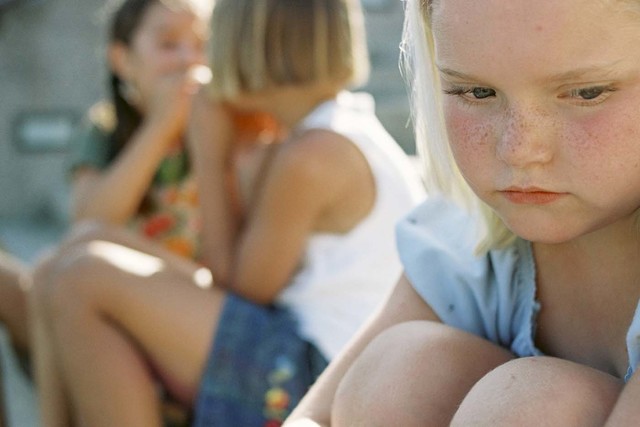Fat shaming starts at alarmingly young age

Never had I heard of a 6-year-old fat shaming another first-grader.
But it happened to a friend’s child this summer.
Her daughter came home from summer school and told her mother that another little girl said she was fat. “I reassured her that people sometimes say mean things,” my friend said.
“A few weeks later, she told me the little girl said she was fat again. I told the director, who said it was the other girl’s last day. So I told (my daughter) she’d never have to see her again.”
As her daughter started first grade, they went to an open house. “There’s the little girl at her class in a totally different school.”
Her daughter had been going to day care at this private school in an upper middle class Las Vegas neighborhood since she was 10 weeks old and there had never been a problem. Now “she was so traumatized, she didn’t want to go back to school.”
The mother, a 39-year-old professional, told the teacher what had happened at the other school and the teacher said she’d keep an eye on her so there would be no problems. However, other first-graders, boys and girls, told my friend’s daughter she was fat.
Two weeks ago, her daughter told her that the boys in her class would flex their muscles and ask the girls to feel them. “I told her they were trying to impress the girls,” the mother said.
Her daughter replied, “I am chubby. Why would they want to impress me?”
At 6, this sweet child is doubting her worth.
“We’ve talked about her being perfect as she is,” her mother said, admitting “she’s a little bit on the chubby side, but I didn’t tell her that.”
She’s 4-feet-1 and 65 pounds. The doctor said she was expected to put on 4 or 5 pounds a year and she’d put on 10. The body mass index calculation showed she was overweight, but not obese.
“I can’t believe 6-year-olds are that aware of their appearances,” the mom said.
To try to help her daughter overcome her new self-consciousness about her body, the mother is complimenting the girl for her strength and her running skills. “She does swim, she’s done soccer and dancing.”
Her parents are thoughtful problem solvers. Their daughter and son are well-loved even if they are bigger kids. The parents are looking for solutions. “We talk about exercising and not eating sugar because it’s not good for your health,” the mom said.
The mom, whose name I am not printing so as not to embarrass their family, is saddened because today “it’s acceptable in our society to treat people who are overweight poorly. It’s still acceptable to be nasty.”
“I’ve been overweight most of my life and I don’t remember it being an issue. I was chunky as a kid, and I don’t remember any kid saying anything to me,” she said.
Here’s the shocker. Fat shaming in first grade isn’t a rarity.
Amanda Harrist, who headed a study published this year in the journal “Child Development” said a study of 1,164 children from 20 rural schools in the South found this kind of behavior by 6-year-olds is “quite common.”
“Severe obesity is a clear psychosocial risk for children, even as early as 6 years old,” said Harrist, professor of child development at Oklahoma State University. The study showed the heavier a child is, the greater the feelings of loneliness, depression and aggression. “Although obese children were neglected by peers, severely obese children were rejected,” the study reported, adding that ostracism has an even greater negative effect on children than bullying.
Like me, Harrist was shocked and saddened by the findings, which used various methods, including showing children photos of their classmates and having them point to the ones they liked to play with and the ones they didn’t. They pointed to the heaviest children as the ones they didn’t want to play with or didn’t like.
Harrist had basic suggestions for parents with overweight children. Don’t nag your children about their eating. They will eat more. Don’t put them on diets. That creates a risk of anorexia or bulimia later. Don’t tell children they are chubby.
For parents with fat-shaming children, talk to them about not teasing someone, whether they are disabled or overweight. Teach children to feel empathy for others.
Here’s my suggestion. Parents need to teach their kids manners and to keep their mean thoughts to themselves.
This isn’t just kids being kids. It’s kids being monsters. And that’s no Halloween story.
Jane Ann Morrison’s column runs Thursdays. Leave messages for her at 702-383-0275 or email jmorrison@reviewjournal.com. Find her on Twitter: @janeannmorrison